|
|
|
Sort Order |
|
|
|
Items / Page
|
|
|
|
|
|
|
| Srl | Item |
| 1 |
ID:
111228
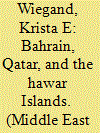

|
|
|
|
|
| Publication |
2012.
|
| Summary/Abstract |
The Hawar Islands dispute, resolved in 2001, is the only territorial dispute between two Arab states that has been resolved by the International Court of Justice (ICJ). Several factors played a role in influencing Qatar and Bahrain to resolve their dispute at the ICJ: 1) the inability of Arab states and the Gulf Cooperation Council (GCC) to mediate the dispute, 2) incentives for significant oil and natural gas reserves, and 3) incentives for bilateral and regional cooperation on salient issues between the two states. Both states have benefited significantly since the resolution of the dispute.
|
|
|
|
|
|
|
|
|
|
|
|
|
|
|
|
| 2 |
ID:
111225
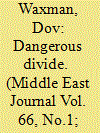

|
|
|
|
|
| Publication |
2012.
|
| Summary/Abstract |
This article examines the relations between Jewish and Palestinian-Arab citizens of Israel since the events of October 2000, when massive Arab protests and riots took place and thirteen Arab demonstrators were killed. In the decade since then Arab-Jewish relations have been characterized by growing mutual mistrust, fear, and hostility. Together with these negative attitudes, political polarization between the two communities has also increased. This poses a serious threat to Arab-Jewish coexistence in Israel and to Israeli democracy itself.
|
|
|
|
|
|
|
|
|
|
|
|
|
|
|
|
| 3 |
ID:
111226
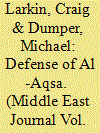

|
|
|
|
|
| Publication |
2012.
|
| Summary/Abstract |
The past ten years have witnessed the collapse of Palestinian political authority and leadership in East Jerusalem. Evidence suggests that the Islamic Movement is beginning to fill this vacuum from within Israel. This article examines the growing involvement of the Islamic Movement of Israel in Jerusalem, both in terms of discourse and specific facts on the ground. It explores how the al-Aqsa mosque has been employed, particularly by Shaykh Ra'id Salah, as a symbol for political empowerment, a site for public contestation, and a focus for religious renewal. It debates whether their presence should be perceived as a growing strategic threat, part of an Islamizing trend, or rather as a consequence of weak local leadership, the unintended consequences of the separation wall and the non-recognition of the Hamas government.
|
|
|
|
|
|
|
|
|
|
|
|
|
|
|
|
| 4 |
ID:
111227
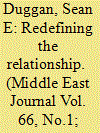

|
|
|
|
|
| Publication |
2012.
|
| Summary/Abstract |
This article traces the US military's foray into public diplomacy (PD) in Iraq since 2003. The military initially assumed PD responsibilities, traditionally a civilian activity, in order to inform the Iraqi people about its wide-ranging reconstruction and development activities. But as the American occupation continued, the military's overwhelming presence throughout the country, its human and financial resources, and its organic transportation and security capabilities assured that it continued to dominate PD activities over the next eight years. As the military completes its withdrawal from Iraq, this article will outline the strengths and weakness of public diplomacy as practiced by the US military, the State Department, and Provincial Reconstruction Teams (PRTs).
|
|
|
|
|
|
|
|
|
|
|
|
|
|
|
|
| 5 |
ID:
111229
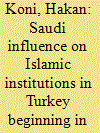

|
|
|
|
|
| Publication |
2012.
|
| Summary/Abstract |
This article investigates the influence of Saudi Arabia on aspects of Islamic social, political, and economic life in Turkey. Since the 1970s, long before the rise of the Justice and Development Party (AKP) of today, Turkish-Saudi Arabian relations have been characterized by an increasing degree of cooperation, solidarity, and partnership centered on certain economic, diplomatic, social, and cultural activities with a good deal of Islamic content. Turkey's orientation toward the Middle East in general and Saudi Arabia in particular traces to the global oil crisis that started in 1973 and its severe effects on the Turkish economy; it also stems from some of Turkey's foreign policy goals with regard to the Cyprus issue and its relations with regional and global actors. Examples of Saudi influence have included the involvement of Saudi-based non-governmental organizations (NGOs) and multinational corporations (MNCs) in Turkey, Turkey's membership in the Organization of the Islamic Conference (OIC), and Turkish labor migration to Saudi Arabia, with a spillover effect in a wide range of other arenas. This particular aspect of Turkish-Saudi Arabian relations is analyzed using the theory of complex interdependence, which underscores the importance of economic, social, and cultural issues in international relations in addition to that of traditional political, diplomatic, and military goals.
|
|
|
|
|
|
|
|
|
|
|
|
|
|
|
|
|
|
|
|
|